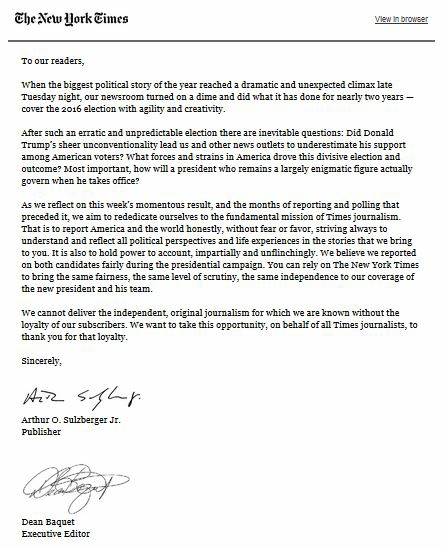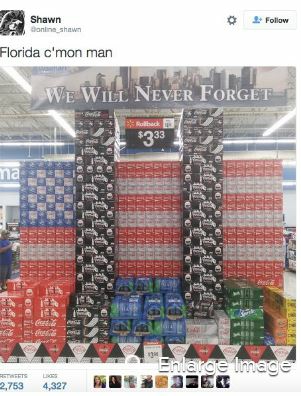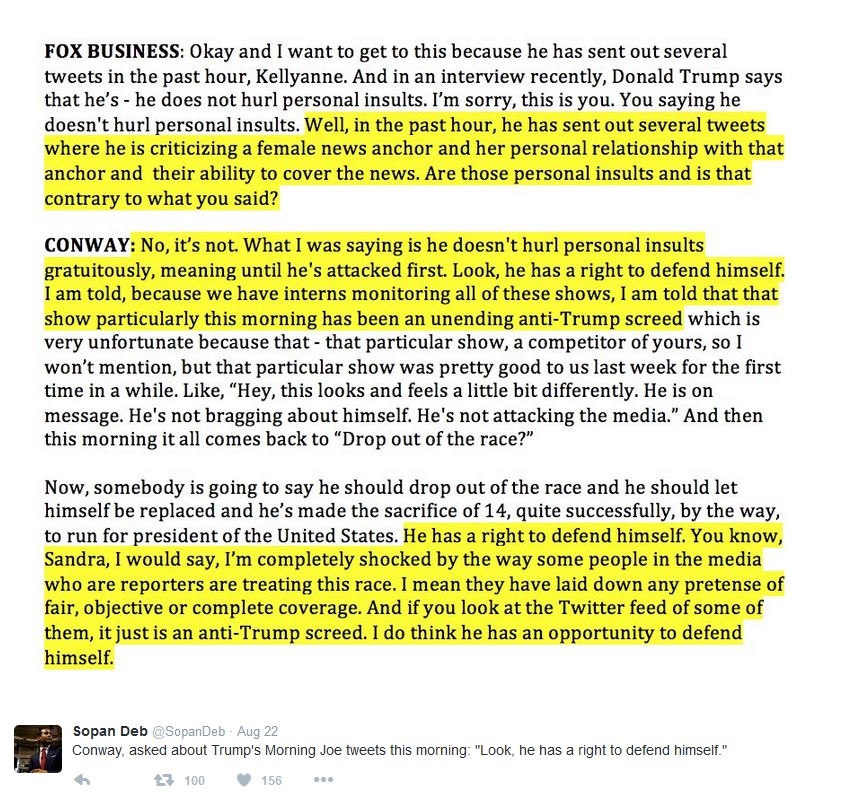Merriam-Webster Tweets
 Business Insider has compiled a bunch of Merriam-Webster tweets about the Trump Administration and its use of language. The video, titled "Merriam-Webster can't stop trolling the Trump administration on Twitter," presents several examples:
Business Insider has compiled a bunch of Merriam-Webster tweets about the Trump Administration and its use of language. The video, titled "Merriam-Webster can't stop trolling the Trump administration on Twitter," presents several examples:
- Highlighted the word most often looked up in November: fascism
- Clarified the difference between "historic" and "historical," a word incorrectly used by Secretary of Education Betsy deVos
- Noted that the Holocaust refers "to the Nazis' mass murder of European Jews" after The White House neglected to mention Jews in the International Holocaust Rememberance Day statement
- Defined "betrayal" after Sean Spicer said he wouldn't define the word during a press conference.
And more.
Discussion:
- What's implied in Business Insider's report? Is this a criticism? I'm not sure.
- How helpful do you find Merriam-Webster's tweets? Some are clarifying and some are not.
Boeing Profits Up
 After facing critical tweets from President Trump about its expensive military planes, Boeing reports quarterly profits better than expected. But the uptick is from commercial plans, a market Boeing is leading.
After facing critical tweets from President Trump about its expensive military planes, Boeing reports quarterly profits better than expected. But the uptick is from commercial plans, a market Boeing is leading.
Boeing's fourth-quarter press release included a few cheery statements from Chairman, President and Chief Executive Officer Dennis Muilenburg:
"With solid fourth quarter operating performance and a sharp strategic focus, we extended our aerospace market leadership in our centennial year and positioned Boeing for continued growth and success in our second century."
"We led the industry in commercial airplane deliveries for the fifth consecutive year, achieved healthy sales in our defense, space and services segments, and produced record operating cash flow, which fueled investment in innovation and our people and generated significant returns to shareholders."
"Looking forward, our team is intent on accelerating productivity and program execution to deliver increasing cash and profitability from our large and diverse order backlog of nearly $500 billion, standing up our new integrated services business, and capturing an even greater share of the the growing global aerospace market to deliver superior value to our customers, shareholders and employees."
Bloomberg reports Boeing shares at record high and that the "787 Dreamliner emerged from a decade of losses." The article quotes an analyst: "We think this release is pretty boring -- and boring is good."
But Fortune warns, "Its overall outlook for 2017, however, is not likely to inspire confidence. Boeing is calling for adjusted earnings between $9.10 and $9.30 this year, which is below the $9.31 that Wall Street analysts were projecting. The company expects revenue will fall to somewhere between $90.5 billion and $92.5 billion, compared to $94.6 billion in 2016."
Discussion:
- We see a lot of jargon in the press release. Is it appropriate or off-putting?
- What does the analyst mean by the "release is pretty boring." Should it be more exciting? It is, after all, good news.
- What are the dangers of the Boeing CEO quotations being overly optimistic, as the Fortune article warns. What's the best approach here?
Analysis of Trump's Inauguration Speech
 Both sides of the aisle seem to agree that President Trump's inaugural address was short and "militant," but analysts disagree on the effect.
Both sides of the aisle seem to agree that President Trump's inaugural address was short and "militant," but analysts disagree on the effect.
NPR's analysts comment on the speech line by line, with some taking issue with his points; for example, he discusses inequities, yet, as one reporter explains, "It's worth noting that despite Trump's anti-establishment message and his frequent promises during the campaign to "drain the swamp," Trump's Cabinet picks so far have included several billionaires and Washington and Wall Street insiders, including billionaire Betsy DeVos, former Goldman Sachs executive Steve Mnuchin, former Exxon Mobil chairman and CEO Rex Tillerson, and countless current and former elected officials."
Fox News host Bill O'Reilly lauds the president's speech, particularly his jabs at the Obama Administration. He also notes that the president criticized President George W. Bush's Iraq and Afghan wars:
"George W. Bush was seated just a few feet away from President Trump. So it's clear that Donald Trump has no sensitivity to the politics of the past, no matter who was in office. His message was directed to his supporters, to the folks, who are fed up with a political process they believe is not helping them."
O'Reilly called it "more like a campaign speech than a presidential address."
Discussion:
- What's your view of the speech? How do your political views influence your opinion?
- Analyze the language choices in Trump's speech. He uses several rhetorical devices.
Is Sears Doomed?
 Yahoo Finance sees little hope for Sears. For years, the retailer has been closing stores and now it seems to be on its last leg. Declining sales caused the company to close 80 stores in July and another 64 through December.
Yahoo Finance sees little hope for Sears. For years, the retailer has been closing stores and now it seems to be on its last leg. Declining sales caused the company to close 80 stores in July and another 64 through December.
CFO Jason Hollar remains optimistic:
We understand the concerns related to our operating performance. We have fallen short on our own timetable for achieving the profitability that we believe the company is capable of generating. With that said, the team remains fully committed to restoring profitability to our company and creating meaningful value.
This next sentence is a lesson in business jargon:
We believe that our liquidity needs will be satisfied through the foreseeable future using the levers available to us through our portfolio of assets.
In other words, they still have stuff to sell off (like brands) to keep the company afloat-perhaps not the best strategy. A failing company that sells its profitable bits is taking a big risk. The CEO of a retail consultancy doubts anything can save the business:
[T]he funds raised are not being used to develop of growth the firm - they are being used to prop up an ailing and failed business.
In our view, it is now too late to turn this around. It is just not financially feasible to reverse it.
How long can this drag on? BizCom in the News posts in 2011 and 2014 also focused on Sears store closings.
Discussion Starters:
- What are the Sears' executives communication choices at this point? They can continue to prop up the brand image, or . . . what are some other options? Assess the potential consequences of each
- Am I too harsh about Hollar's comment? If you were advising him to use simple or "plain" language, what would you suggest he say instead? You might consider a little emotional appeal as well.
- Hollar mentioned Kenmore as a potential sales opportunity. What's Sears without Kenmore?
Some Carrier Jobs Will Be Saved
 Some Carrier employees in Indiana will keep their jobs, while other positions, as planned, will move to Mexico.
Some Carrier employees in Indiana will keep their jobs, while other positions, as planned, will move to Mexico.
President-elect Donald Trump has met with Carrier executives to keep the plant open for manufacturing gas furnaces. This is good news: more than 1,000 U.S. positions will be saved, but communication with employees has been lacking. Understandably, employees are skeptical about the decision and want more details.
Here are a few quotes from those affected:
- "There's excitement with most people, but there's a lot of skepticism and worry because we don't know the details."
- "There's a few that are worried. And there's still a few that don't even believe this is real. They think it's a play, a set-up or a scam."
- "Who is going to be retained? What is the structure there will be for the retention? What is going to be put in place?" "Are these the same jobs at the same wage? I would sure like to know as soon as I can."
- "I'm optimistic, but I don't know what the situation is. I guess it's a good sign. ... You would think they would keep us in the loop. But we know nothing."
The last quotation is from the president of a local United Steelworkers union. The plant closure was announced in February and video recorded by an employee. During the meeting, the speaker said that they would involve union representatives, but they may be a missing link in this recent news.
Carrier released a statement about the decision, claiming, "The incentives offered by the state were an important consideration." Vice President-elect Mike Pence is currently the governor of Indiana.
Discussion Starters:
- What advice would you give to Carrier executives about how the plan is communicated? Consider how the initial announcement took place as well.
- The company has a practical challenge: although they may have accepted incentives to keep the plant open, details about staffing have yet to be worked out. How can they communicate with employees in the meantime?
Grubhub CEO: Agree or Resign?

The CEO of Grubhub had a tough message for employees who disagree with his anti-Trump sentiment: "you have no place here." After the election, Matt Maloney wrote an email about tolerance and inclusion. He expressed his disappointment in Trump's election, particularly his "demeaning, insulting and ridiculing minorities, immigrants and the physically/mentally disabled" and his "nationalist, anti-immigrant and hateful politics."
He went a step further at the end of the email:
"If you do not agree with this statement then please reply to this email with your resignation because you have no place here. We do not tolerate hateful attitudes on our team. I want to repeat what Hillary said this morning, that the new administration deserves our open minds and a chance to lead, but never stop believing that the fight for what's right is worth it."
Media reports and social media responses interpreted Maloney's message as a threat: anyone who voted for Trump should resign.
Maloney has responded that his email was misinterpreted:
"I want to clarify that I did not ask for anyone to resign if they voted for Trump. I would never make such a demand. To the contrary, the message of the email is that we do not tolerate discriminatory activity or hateful commentary in the workplace, and that we will stand up for our employees."
This distinction is important; otherwise, the company may be discriminating against people based on political views.
Discussion Starters:
- Read Maloney's full message to employees and his statement. How do you interpret his original message and the explanation?
- Should Maloney have sent the email to employees? What are the benefits and risks to the company and to him personally?
- Could Maloney have revised the email to avoid the controversy? How so?
NY Times Promises Fair Coverage
The New York Times publisher and executive editor sent an unusual email to subscribers about election coverage. Poynter reports that this email and another to employees were in response to criticism of left-leaning coverage of the campaign.
The message is both reflective and forward-looking, questioning an unprecedented election and assuring readers fair coverage of President Trump in the future. The publisher and editor promise to stay true to the newspaper's core mission, and they thank loyal customers.
Arthur Sulzberger is the newest member of the family to be named publisher of The Times. A fifth-generation publisher, Sulzberger is a descendant of Adolph S. Ochs, who bought the paper in 1896.
The email comes after Sulzberger sent an internal memo to staff:
Dear Colleagues,
As we close one of the most momentous weeks in our nation's recent history, let's pause for a moment on those famous instructions that Adolph S. Ochs left for us: to cover the news without fear or favor.
As Donald Trump begins preparing for his new administration, those words have rarely felt more important.
The Times is certainly not afraid - our investigative report has demonstrated our courage many times over. That fearless, hard-fought journalism will always stand as the backbone of The Times, no matter the President.
But we also approach the incoming Trump administration without bias. We will cover his policies and his agenda fairly. We will bring expert analysis and thoughtful commentary to the changes we see in government, and to their ramifications on the ground.
We will look within and beyond Washington to explore the roots of the anger that has roiled red and blue America. If many Americans no longer seem to understand each other, let's make it our job to interpret and explain.
Our predecessors founded our singular newspaper for just this moment - to serve as a watchdog to the powerful; and to hold mighty institutions accountable, without fear or favor. We are more than ready to fulfill that promise.
Together, we have built the world's best digital newsroom and it, too, was made for just this moment. We will chronicle the new administration with a lightning-fast report that features stories told in every medium and on every platform.
Here is what we have all dedicated our careers to: Going after the biggest stories in the world, and telling them as ambitiously as possible.
Get some rest this weekend. We have lots to do.
Arthur
Discussion Starters:
- You might read this as either an admission or a defense. What's your view?
- What are the communication objectives of both emails? You might consider the newspaper business today. To what extent do you think they meet those objectives? Overall, are the messages effective?
- Assess the writing style against principles in Chapter 5. Pay particular attention to word choice and sentence structure.
Wells Fargo's New Commercial
Wells Fargo is trying to rebuild its image after facing the scandal that it opened accounts for people who didn't request them and weren't aware they had them. Until now, we heard little from the company, except an email to some customers and a full-page ad with plans that seemed quite basic.
A new, short commercial focuses on three points: fully refunding those impacted, proactively sending new account confirmations, and eliminating product sales goals.
These actions are a bit more specific than what has been communicated in the past. However, a skeptic like me might say these steps are still the bare minimum that the company can do for customers. Also eliminating product sales goals, which arguably caused the trouble because they were overly aggressive, should have been done years ago, particularly now that we know employees had reported issues but were ignored or retaliated against.
Discussion Starters:
- Assess this commercial. Who are the primary and secondary audiences? What are the communication objectives? How well does the company achieve them?
- Consider the language choices. The three actions aren't quite parallel. What other changes could be made?
- What else should Wells Fargo do at this point to rebuild its image?
Layoffs at Twitter
Twitter is laying off about 9% of employees and closing Vine, the short video app it purchased in October 2012 before it launched. When Instagram offered video options, Vine immediately lost much of its user base. About 350 employees are affected.
Layoffs are awkward for Twitter, a site sometimes used for "live tweeting" bad news. In this case, a former employee created a Twitter Moment, "Last Day at Twitter." Exiting employees also used the hashtag #TwitterLayoffs. This could be risky for a company, but the posts are positive. It could be that employees enjoyed their time at Twitter and understand the rationale for layoffs. It could also be that employees are in high demand from other companies, so they won't be out of work too long.
Discussion Starters:
- Why do you think employees tweeted nice messages on their last day? I offered two theories. Any other ideas?
- Should the company have created its own hashtag for the event to pre-empt something worse? Why or why not?
Communications About the Outage
The latest cyberattack left Netflix, Spotify, Amazon, Etsy, and other sites spinning and apparently deciding how much and what to communicate to users. Issues at Dyn, a host company, affected the others, and Dyn was communicating regularly during the outage.
Amazon, for example, seemed to communicate nothing at all in its press releases, on its blog or on its Twitter feed: all highlight company activities and products for Halloween.
Discussion Starters:
- Why would Amazon not communicate about the outage? Do you think this was a good decision? Consider the technology impact and responsibilities.
- Assess Dyn's communication. This isn't the traditional apology. How well does it work? Consider the audience and communication objectives in your response.
Legal Briefs Get (a Little) Shorter
 Legal writing isn't business writing. Judges have argued for briefer briefs, but not everyone agrees. Currently, these documents, which detail arguments in a legal case, max out at 14,000 words or about 57 pages of double-spaced text. Lawyers contend that they need more space but have agreed to reduce the number of words by 1,000, which is 1,500 fewer words than the original proposal.
Legal writing isn't business writing. Judges have argued for briefer briefs, but not everyone agrees. Currently, these documents, which detail arguments in a legal case, max out at 14,000 words or about 57 pages of double-spaced text. Lawyers contend that they need more space but have agreed to reduce the number of words by 1,000, which is 1,500 fewer words than the original proposal.
Before lawyers had a word limit for briefs, they had a page limit. But the 50-page limit frustrated judges because lawyers would simply reduce the font size and page margins, making reading difficult.
According to a Wall Street Journal report last year, judges (no surprise) prefer reading shorter briefs:
"It's hard to persuade lawyers on this point, says Bryan Garner, editor of Black's Law Dictionary. "They don't like to own up to their own diffuseness and verbosity," he said. "The way judges rebel at aimless verbose writing is they simply stop reading. The scarcest resource in any judge chamber is a judge's attention."
Supreme Court Justice Clarence Thomas confirmed the sentiment: "When you see one that's 50, and you see this guy has crammed every square centimeter or millimeter he could find on the page, that's when you say, my goodness!"
Discussion Starters:
- What are the value and downsides of having word limits for legal briefs?
- Do you buy lawyers' arguments that they need more words to present their case? Why or why not?
- What types of business documents (other than writing for classes) have page or word limits?
Amazon Cancels Incentivized Reviews
In a blog post, Amazon announced the end of incentivized reviews.
Although the incentives were limited to customers who disclosed that they received a free or discounted product, the reviews were sponsored by companies, and Amazon will change that. Putting the reviews in perspective, Amazon wrote, "These so-called ‘incentivized reviews' make up only a tiny fraction of the tens of millions of reviews on Amazon, and when done carefully, they can be helpful to customers by providing a foundation of reviews for new or less well-known products."
The move is part of Amazon's goal of increasing trust in reviews. In the past, incentivized reviews meant better reviews: 4.74 stars out of 5 compared to 4.36.
Amazon will continue its Vine program, which encourages reviews but doesn't have the same reward system:
"Amazon – not the vendor or seller – identifies and invites trusted and helpful reviewers on Amazon to post opinions about new and pre-release products; we do not incentivise positive star ratings, attempt to influence the content of reviews, or even require a review to be written; and we limit the total number of Vine reviews that we display for each product."
Discussion Starters:
- Analyze Chee Chew's blog post. Who are the primary and secondary audiences? What are the communications objectives, and how well does Chew achieve them?
- How would you describe the distinctions between the incentivized reviews and the Vine program? Are you convinced that Vine reviews will be objective?
New Leadership at HomeAway
 HomeAway, a property rental site similar to Airbnb, has announced a new CEO. A message from the co-founder and chairman, Brian Sharples, explained the change:
HomeAway, a property rental site similar to Airbnb, has announced a new CEO. A message from the co-founder and chairman, Brian Sharples, explained the change:
Hello Owners and Property Managers.
I wanted to reach out to you directly to let you know about some big news for both HomeAway and me personally. After 12 years at the helm at HomeAway, I have made the very difficult decision to step down as CEO and have chosen John Kim, our current Chief E-Commerce Officer, to lead the company as President. We will gradually move through this transition and I will remain on board as Chairman until mid-January to advise John and the leadership team for the remainder of the year.
While it's never easy to hand over the reins of something you built, I believe now is the right time to empower the next generation of leadership to take HomeAway to new heights. John is already an incredible driving force for the growth of our company. I'm very comforted in knowing we have someone of his caliber with rich experience in product development and innovation to lead our mission and strategy.
As the vacation market grows, so does the expectation of customers to have a superior online experience. John's proven ability to transform web and mobile sites will help HomeAway build the right customer experience to attract even more travelers to your properties. John looks forward to sharing his vision with you and will be hosting a Q&A session on October 19th at 10:00am CT. Please click here to sign up. You may also submit questions in advance for John to address during this webcast.
I want to thank you for trusting HomeAway with your business and for the feedback and support you have provided me personally over the last several years. You have helped us break ground in this industry, and as a frequent HomeAway traveler, I look forward to seeing many of you at your amazing properties in the coming years!
Best regards and heartfelt appreciations,
Brian Sharples
Co-Founder and Chairman of HomeAway, Inc.
Sharples emphasizes Kim's technology experience and sells the decision to property owners as helping to provide "the right customer experience to attract even more travelers to your properties."
An article in the Austin Business Journal describes HomeAway as a successful business in Austin, TX, founded in 2005 and sold to Expedia last year. In a statement, President and CEO of Expedia Dara Khosrowshahi said that Sharples "leaves behind an incredible foundation and legacy that we plan to build on as part of the Expedia Inc. family." Today, the company has 1,540 employees and lists homes for rent in more than 190 countries.
Discussion Starters:
- Assess Sharples' message. Who is the audience, and what are his objectives? How well does he achieve the objectives?
- The message seems to leave out some information. What is Sharples not saying, and why isn't he clearer?
Marriott + Starwood: Completion Announcement to Staff
The deal is finally done: Marriott and Starwood are one company. Starwood associates received this message from Marriott Communications under the subject line, "A Historic Moment: Marriott + Starwood Merger Complete." The message continues, highlighting the combined company's impressive portfolio of brands and properties. Associates are also invited to find out more on a "new integration site" called "The Platform."
The message comes almost a year after the acquisition was announced and confirms the largest hotel company in the world, with 5,809 properties and more than 1.1 million rooms. Executive Chairman Bill Marriott expressed his enthusiasm for the deal, focusing on people and culture:
"We hope to continue the trend of promoting, developing and working with people. We have the strongest culture, I think, of any lodging company, and of most companies in America. And we'll continue to promote and really strengthen that culture."
Starwood will cease to exist. The HOT symbol will be removed from the New York Stock Exchange.
Discussion Starters:
- In the message, identify all types of sentences: simple, complex, and compound. How varied are the sentences?
- How would you characterize the tone of the message? Do you find it appropriate for the primary audience (Starwood employees?)
More Recalls at Blue Bell
 Just when we thought the trouble had passed for Blue Bell Creamery, the company is recalling Cookie Dough ice cream because of Listeria concerns. Last year, Blue Bell recalled several products, which resulted in staff layoffs, a difficult situation for a family-owned company with loyal employees.
Just when we thought the trouble had passed for Blue Bell Creamery, the company is recalling Cookie Dough ice cream because of Listeria concerns. Last year, Blue Bell recalled several products, which resulted in staff layoffs, a difficult situation for a family-owned company with loyal employees.
This time, the company is clearly blaming external supplier Aspen Hills. The latter company's recall announcement tops Blue Bell's webpage. Then, Blue Bell's press release is titled to deflect responsibility:
"BLUE BELL ICE CREAM RECALLS SELECT PRODUCTS CONTAINING CHOCOLATE CHIP COOKIE DOUGH PIECES PURCHASED FROM OUTSIDE SUPPLIER ASPEN HILLS DUE TO POSSIBLE HEALTH RISK"
Blue Bell uses a similar strategy on its Facebook page, pointing to Aspen Hills as the cause of the problem. To downplay the issue, the company starts the announcement with "Out of an abundance of caution," further putting the bad news in context. 
Discussion Starters:
- Who are the audiences for Blue Bell's announcement? Identify primary and secondary audiences and analyze each.
- How well is Blue Bell announcing the bad news? Consider principles from Chapter 8, Bad-News Messages.
- Analyze word choices in all Blue Bell communications. Which are the most powerful? Which could be improved?
Offensive 9/11 Mattress Company Ad
What were they thinking? Miracle Mattress in San Antonio, TX, produced a commercial advertising twin mattress prices for 9/11. At the end of the ad, two employees fall into "towers" of mattresses, and the lead actor says, "We'll never forget."
Understandably, people were outraged. This reminds me of the golf club that used a similar promotion in 2013. Also, this year, Coca-Cola took down a display of soda cartons at a Florida Walmart.
The company owner posted an apology and announced the store's closing on Facebook. He said elsewhere that he was unaware of the ad created by his employees.
Discussion Starters:
- How are these promotions different from, for example, Memorial Day sales?
- Assess the owner's apology. What principles of persuasion does he use? What recommendations do you have for improving the message?
- In this post, the owner didn't mention that he was unaware of the ad, as he did in other sources. What's your view of this choice?
Wells Fargo Reaches Settlement Agreement
 Wells Fargo is taking action after the discovery that bank employees opened millions of fake checking and credit card accounts. Employees opened accounts in unsuspecting customers' names so they could earn credit for the sale. The bank benefited from fees people paid on accounts they never used.
Wells Fargo is taking action after the discovery that bank employees opened millions of fake checking and credit card accounts. Employees opened accounts in unsuspecting customers' names so they could earn credit for the sale. The bank benefited from fees people paid on accounts they never used.
In addition to paying a $100 million settlement fee to the Consumer Financial Protection Bureau, the bank has fired 5,300 employees over the past few years.
The company issued two major communications related to the situation:
In addition, Jim Cramer interviewed CEO John Stumpf on Mad Money:
Discussion Starters:
- Compare the two Wells Fargo statements. How well does the company tailor these messages to primary and secondary audiences?
- How can customers miss paying fees? What is their responsibility, and what is the company's? Consider visual displays of bank statements in your response.
- How well does Stumpf respond to Jim Cramer's questions? Which are his strongest and weakest arguments?
British Airways Apologizes for Delays
 Computer issues plagued Delta recently, and now British Airways is feeling the pain. Tens of thousands of customers have been delayed while checking in, dropping off luggage, and waiting to take off. Frequent fliers may remember similar delays in July, when the airline was upgrading its check-in system. This time, an IT issue shut down some systems, causing staff to hand write boarding passes.
Computer issues plagued Delta recently, and now British Airways is feeling the pain. Tens of thousands of customers have been delayed while checking in, dropping off luggage, and waiting to take off. Frequent fliers may remember similar delays in July, when the airline was upgrading its check-in system. This time, an IT issue shut down some systems, causing staff to hand write boarding passes.
The airline apologized for the delays, admitting that processes have been "taking longer than usual": "We are sorry for the delay to their journeys." Although passengers were actively complaining on Twitter, the company had little to say online. The Twitter page has only one reference to the delays-after the issues were resolved.
But some customers did receive a letter, posted in an NBC article.
Discussion Starters:
- Assess the letter to customers. What principles of letter writing and bad-news messages does the airline follow in this communication? What would improve the letter?
- What word choices and other aspects of the letter tell you it's British? Why did the airline chose this method of communication?
- What else, if anything, should the airline have communicated on social media?
More Jargon to Banish
 Once a year or so, I write about business clichés and jargon. This infographic, generated by GoToMeeting is a good summary of perhaps the worst examples heard in companies recently.
Once a year or so, I write about business clichés and jargon. This infographic, generated by GoToMeeting is a good summary of perhaps the worst examples heard in companies recently.
Here are some of my favorites (to avoid, that is):
- Content is king (Who's the queen?)
- Game change, par for the course, and other sports references I don't understand
- With all due respect, which usually indicates no respect at all
- Do more with less, a.k.a. work harder for less pay
- Open the kimono, which has both sexual and racial overtones.
Discussion Starters:
- What's the value of business jargon? It's not all bad.
- Compare these 50 to those in Chapter 5 of the textbook. Which are most and least familiar to you?
- Do you find any of the terms offensive?
Trump Vs. Morning Joe
Now, Donald Trump is feuding with the hosts of MSNBC's Morning Joe, Mika Brzezinski and Joe Scarborough. Earlier this month, Scarborough wrote a scathing piece in The Washington Post, "The GOP Must Dump Trump." He ended by encouraging Republicans to withdraw their support and find a new candidate:
"A bloody line has been crossed that cannot be ignored. At long last, Donald Trump has left the Republican Party few options but to act decisively and get this political train wreck off the tracks before something terrible happens."
Escalation of the debate has continued, as Brzezinski said he sounded as if "he's had a lot to drink" during a campaign rally speech in Fredericksburg, VA.
Trump did not enjoy that comment and struck back with a series of tweets matched by Scarborough, who shot back, "Neurotic and not very bright? Look in the mirror."
 The tweets came a few hours after Trump's campaign manager said he doesn't insult people. This is from Huffington Post:
The tweets came a few hours after Trump's campaign manager said he doesn't insult people. This is from Huffington Post:
"I don't like when people hurl personal insults," Kellyanne Conway told ABC News' "This Week." "That will never be my style, I'm a mother of four small children, it would be a terrible example for me to feel otherwise ... [Trump] doesn't hurl personal insults."
And yet Conway told Fox Business, "He has a right to defend himself."
Discussion Starters:
- When you watch the clip from Morning Joe, what do you notice about Brzezinski's delivery of the comment? How do others on the show react? Do you think she may regret her comment?
- How should Trump have reacted? And how should Scarborough have responded? As always, all players in the situation had several choices throughout these exchanges.




























